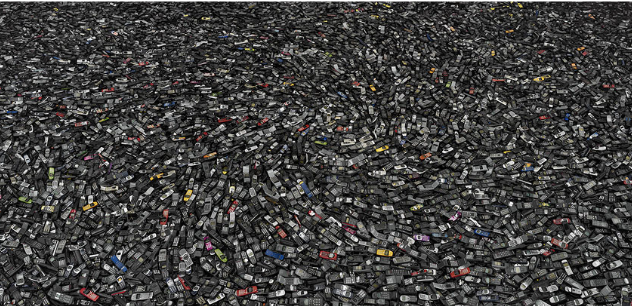
I’ll admit I’m probably not the first person my friends think of when they think of digital rhetorics. I’ve pulled my hair out trying to move Google Docs from one folder to another, and I avoid systems updates on my phone like the plague. I don’t have a background in coding, or website design, or video editing. My engagement with digital rhetorics is not born out of love—or even swelling interest. Instead, my first soiree into digital rhetorics was a class in my master’s program called “Internet of Garbage.” The title says it all. I was handed rose-colored glasses only to rip them off, and I’ve been critical ever since. In this class, taught by Jim Brown at Rutgers-Camden, we talked about what the internet enables, like communities of mutual support and communities of concentrated hatred. We talked about the materiality of the internet and the geography of digital ephemera—how most of it ends up tucked away in ever-expanding data centers or garbage dumps in the global South.

I only grew more critical as I befriended, dated, and then married my partner, who studies computer science and who feels the same way I do about technology cultures. We’ve spent hours dissecting the problems with technosolutionism (the implicit belief that any new technology is a necessary and good technology for solving the world’s problems) and listening to techno-critical podcasts like Paris Marx’s Tech Won’t Save Us. To be fair, we’ve also spent hours watching and bonding over Vine compilations and music videos, and curating TikToks we know the other will laugh at—so it’s not all bad.
As I’ve pursued my research interests at the intersection of literacy studies, migration studies, and institutional rhetoric, I couldn’t help noticing the ways in which the digital appears alongside the material conditions present in my case studies. For example, the current US immigration regime uses a range of apps that help officials access individuals’ biometric information “in the field,” while those same officials make use of analog privacy measures like wearing face coverings. Similarly, officials also increasingly demand access to travelers’ phones in order to browse their personal photos, correspondence, and social media accounts, while DHS claims that face coverings and other privacy measures are necessary to prevent officials from being doxxed.
Happening in conjunction with increased state surveillance is the expansion of data centers, which promise to hold our data indefinitely—no matter the environmental cost. The overlap between technosolutionism and the increased surveillance of the state and mega-companies like Meta and Google worries me, not only because of the ways in which these forces reach into individuals’ lives and move them, but also because of how we’re destroying our and our planet’s future in the process.
So I guess what I’m saying is my participation in the Digital Rhetorics Collaborative feels incidental, but it also seems like a natural component of my research trajectory. As I researched the ways in which writing by and about migrants shapes migrants lives, I wasn’t seeking out the digital. But when looking for where rhetoric was, I realized that what is digital is important—necessary—infrastructural—to understanding and addressing the problems I’ve identified. I hope to continue exploring these intersections in my fellowship with the DRC this year, which promise to inform the direction of my dissertation research in the composition and rhetoric program at UW-Madison.

